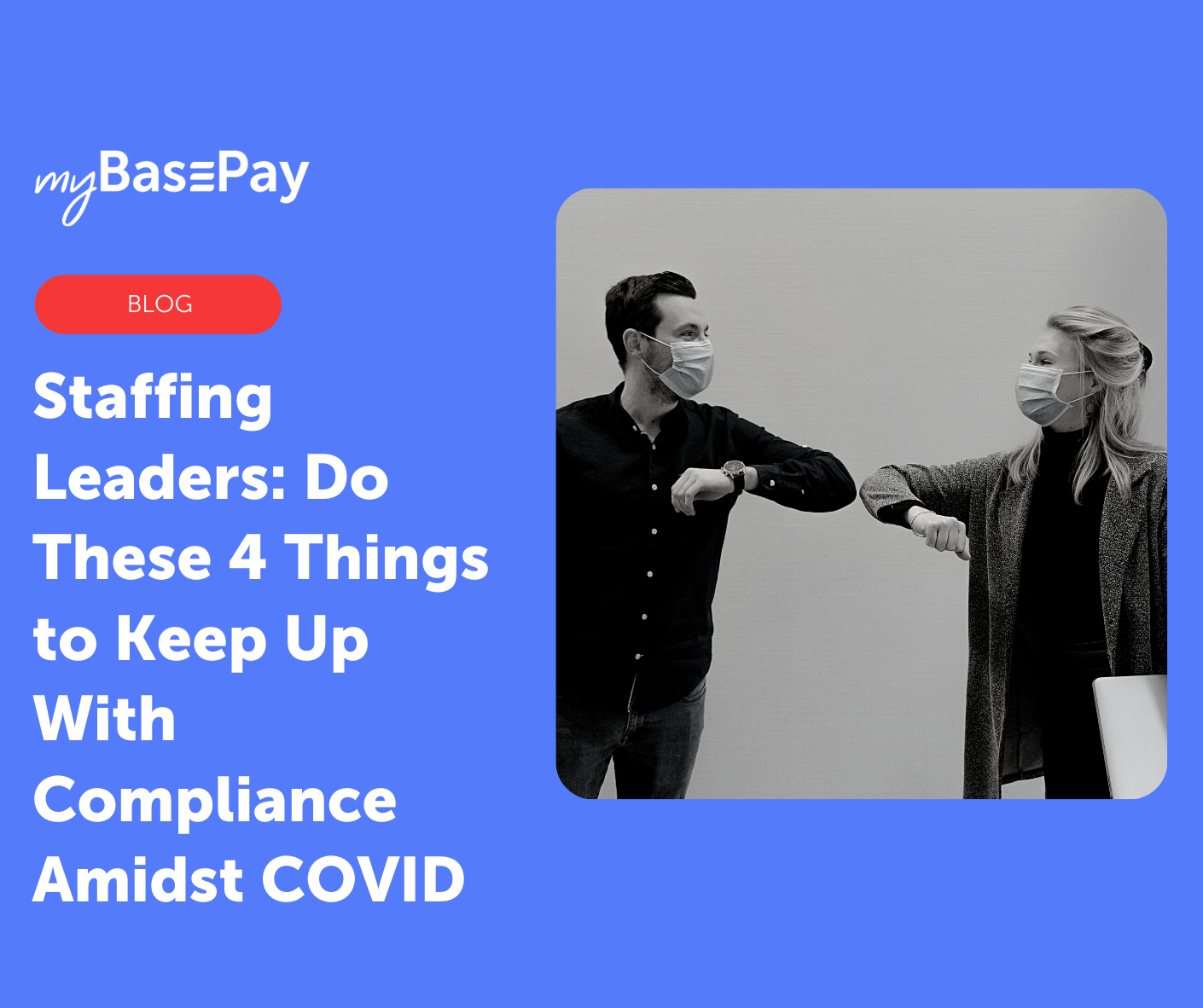Staffing Leaders: Do These 4 Things to Keep Up With Compliance Amidst COVID
While many government-imposed COVID restrictions have been lifted across much of the country, this doesn’t mean that staffing leaders no longer have to worry about COVID compliance.
Different clients have varying vaccine mandates, testing regimes and other requirements designed to limit the spread of the virus. Because of this, staffing leaders face an even more complex landscape, as requirements don’t just vary from state to state, but even from client to client.
This can make accommodating contingent workers who are required to be on-site for their clients increasingly difficult — and even create new challenges for workers who are entirely remote.
However, as insights from our presentation “What Staffing Leaders Need to Know About Compliance in the Age of COVID” at the 2022 Executive Forum North America reveals, there are several things staffing leaders can do to mitigate compliance risk.
1. Keep COVID-Related Requests Within Compliance
While a client may have its own vaccination requirements, staffing firms are not legally allowed to ask applicants about their vaccination status. Proof of vaccination can only be required after offering a position to the applicant. Prior to this, the staffing firm can only inform applicants of the client’s vaccination requirements.
To ensure this, the conference presentation strongly warned against letting clients interview workers, in large part because they are often unaware of compliance rules:
“Clients can do some of these illegal things without your knowledge, even screening out certain people and ask them things that they shouldn’t. I’ve always thought the client interviewing was a bad idea. They pay us to do this — we do the selection — but I know there’s a great demand for it. […] That exposes you…just as well as it exposes with the client.”
Make it abundantly clear to clients that regardless of their policy, proof of vaccination status cannot be requested until the onboarding process. Keep control of the interview and onboarding process to ensure these requests remain compliant with relevant regulations.
2. Maintain Familiarity With State Laws
Each state reacted to the COVID-19 pandemic differently — and each state has managed the “return to normal” differently, as well. Of course, COVID-19 requirements are hardly the only area where states can have drastically different laws and expectations.
To illustrate how easy it is to run afoul of state compliance, the conference presenters explained: “Do you know the overtime rules in this state in which the person’s working? Do you know the law as it relates to final paycheck? When do they have to be given their final wages? How often do they have to be paid? […]
“Did you reimburse them some percentage of their cell phone or ISP plan with respect to their remote work? You have to look in each jurisdiction and expense reimbursement. Paid time off sick leave. COVID lead. Many states are developing their own emergency COVID leads, new hire reporting. So if you hire someone in a jurisdiction, are you reporting to the authorities?”
These examples are just the tip of the iceberg in terms of state compliance concerns. States such as New York have additional regulations related to hiring and placement — such as not including marijuana in drug tests used for background checks. Several states, including California, Colorado and Virginia, require that employers of a certain size who do not offer a retirement plan enroll workers in the state’s auto-IRA plan.
Keeping up with the varying regulations for each state is a lot of work. However, maintaining full compliance with the states where a staffing firm places workers is vital to avoid regulatory fines, penalties and audits.
3. Develop Arbitration Agreements
As was noted in the forum presentation, staffing firms are at risk of being targeted in class-action lawsuits due to the large numbers of employees they work with and the complications involved in managing compliance in so many different states.
This concern is so significant that the panel noted, “I hope you have arbitration agreements with class action waivers. […] To me, it’s the class action lawsuits and the litigation that I worry about more than, you know, kind of an overburdening government regulator coming in, which is possible, but it’s not kind of my first concern.”
By entering into this legally binding agreement, staffing firms can avoid civil court litigation if a dispute arises with their contingent talent. Arbitration agreements can provide faster and less expensive resolutions to conflicts, that are also much more flexible and keep the conflict off the public record. Entering into such agreements can provide much-needed protection in an increasingly complex compliance landscape.
4. Know Where Workers Are Located at All Times
One of the greatest compliance challenges in today’s work environment is keeping track of where a remote worker is actually located. Data from the U.S. Census Bureau shows states like Florida, Texas, Arizona and the Carolinas experiencing high levels of inbound migration. California, New York and Illinois, on the other hand, have experienced significant outbound migration in recent years.
This can create compliance issues not just in regards to hiring and retention laws, but also in situations where an employer is paying state payroll tax. Staffing leaders can reduce compliance issues with individual workers by requiring them to inform the organization of a change in address.
Of course, some organizations may not be equipped to hire workers in some areas due to compliance concerns. As the panel explained, “If the client wants to hire workers in jurisdictions that are beyond what was already in the contract […] It’s not just moving people. It’s hiring them in jurisdictions where we’re not prepared operationally to comply with the laws.”
Agreements designating where you hire and place workers will reduce compliance concerns by keeping the workforce located in areas where you are able to operate.
Reduce Organizational Risk With myBasePay
At MyBasePay, our team is intensely aware of the ever-evolving compliance issues that staffing leaders are dealing with in the wake of the COVID-19 pandemic.
Our back office solutions provide a comprehensive suite of functions for full compliance administration. With employer of record services that meet the urgency of your daily operations while also enabling zero-risk scaling, you can make placements with confidence.
Author: Cesar Romero
Cesar is the Head of Marketing at myBasePay, where he’s responsible for overseeing the company’s content marketing, community, and partnerships strategy. He also co-hosts The Ivy Podcast where he interviews executives from Fortune 500 companies on executive leadership. When he’s not helping startups with marketing and community strategy, you can find him paying it forward by serving as a mentor for leading organizations like StartingBloc, Hive, and Global Citizen Year.






